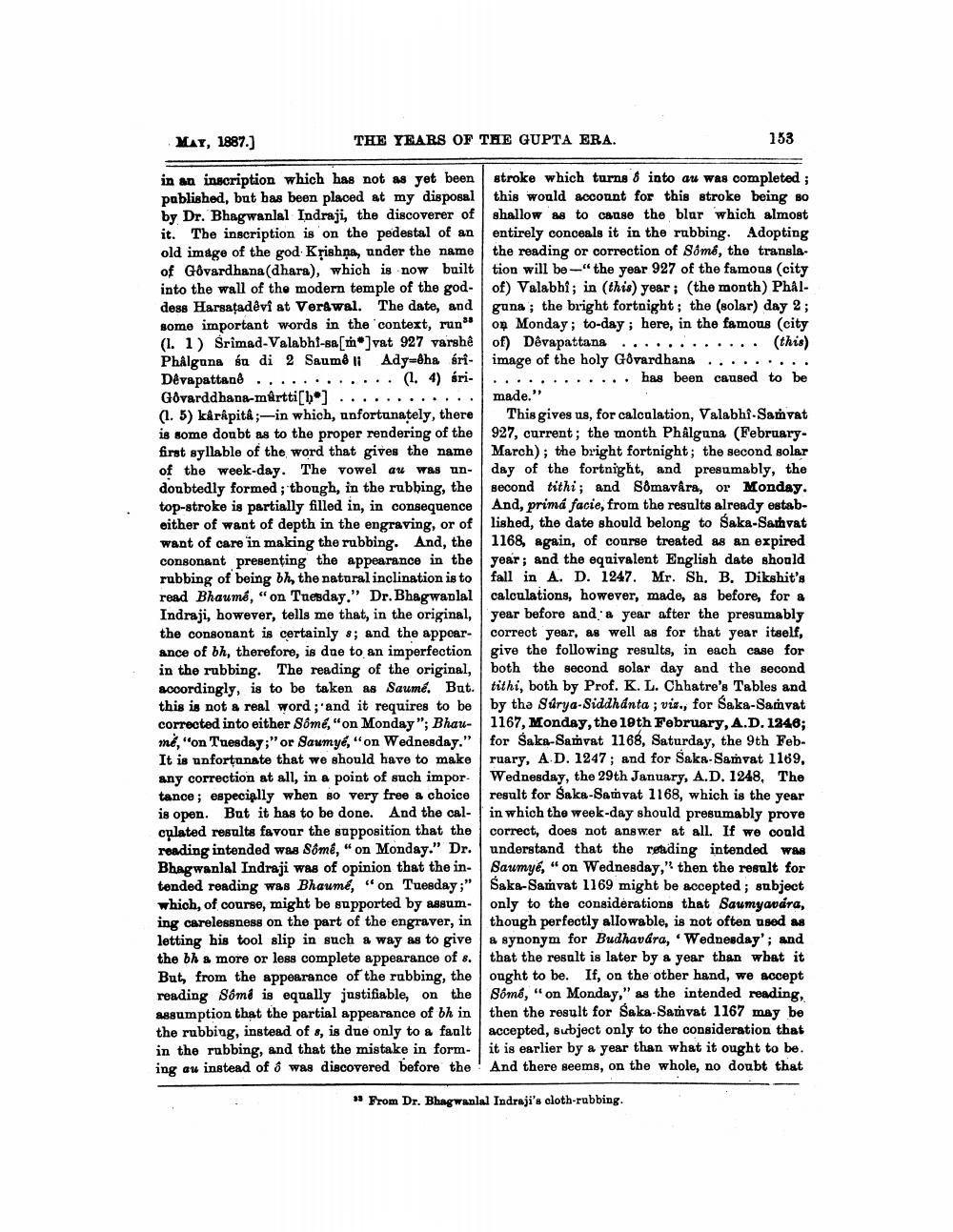________________
THE YEARS OF THE GUPTA ERA.
MAY, 1887.]
in an inscription which has not as yet been published, but has been placed at my disposal by Dr. Bhagwanlal Indraji, the discoverer of it. The inscription is on the pedestal of an old image of the god Krishna, under the name of Govardhana (dhara), which is now built into the wall of the modern temple of the goddess Harsaṭadêvî at Verawal. The date, and some important words in the context, runs (1. 1) Srimad-Valabhi-sa[m]vat 927 varshê Phalguna su di 2 Saumê li Ady-éha ériDêvapattanê ... (1. 4) śriGôvarddhana-mârtti[b*] (1. 5) kârâpita;-in which, unfortunately, there is some doubt as to the proper rendering of the first syllable of the word that gives the name of the week-day. The vowel au was undoubtedly formed; though, in the rubbing, the top-stroke is partially filled in, in consequence either of want of depth in the engraving, or of want of care in making the rubbing. And, the consonant presenting the appearance in the rubbing of being bh, the natural inclination is to read Bhaumé, "on Tuesday." Dr. Bhagwanlal Indraji, however, tells me that, in the original, the consonant is certainly s; and the appearance of bh, therefore, is due to an imperfection in the rubbing. The reading of the original, accordingly, is to be taken as Saumé. Bat. this is not a real word; and it requires to be corrected into either Sômé, "on Monday"; Bhaume, "on Tuesday;" or Saumye, "on Wednesday." It is unfortunate that we should have to make any correction at all, in a point of such impor tance; especially when so very free a choice is open. But it has to be done. And the calculated results favour the supposition that the reading intended was Sômé, " on Monday." Dr. Bhagwanlal Indraji was of opinion that the intended reading was Bhaumé, "on Tuesday;" which, of course, might be supported by assuming carelessness on the part of the engraver, in letting his tool slip in such a way as to give the bh a more or less complete appearance of s. But, from the appearance of the rubbing, the reading Sômé is equally justifiable, on the assumption that the partial appearance of bh in the rubbing, instead of s, is due only to a fault in the rubbing, and that the mistake in forming au instead of 6 was discovered before the
...
153
stroke which turns & into au was completed; this would account for this stroke being so shallow as to cause the blur which almost entirely conceals it in the rubbing. Adopting the reading or correction of Sômé, the transla tion will be-"the year 927 of the famous (city of) Valabhi; in (this) year; (the month) Phålguna; the bright fortnight; the (solar) day 2; on Monday; to-day; here, in the famous (city of) Dêvapattana (this)
image of the holy Govardhana
.. has been caused to be
made."
This gives us, for calculation, Valabhî-Samvat 927, current; the month Phâlguna (FebruaryMarch); the bright fortnight; the second solar day of the fortnight, and presumably, the second tithi; and Sômavara, or Monday. And, primá facie, from the results already established, the date should belong to Saka-Sathvat 1168, again, of course treated as an expired year; and the equivalent English date should fall in A. D. 1247. Mr. Sh. B. Dikshit's calculations, however, made, as before, for a year before and a year after the presumably correct year, as well as for that year itself, give the following results, in each case for both the second solar day and the second tithi, both by Prof. K. L. Chhatre's Tables and by the Surya-Siddhanta; viz., for Saka-Samvat 1167, Monday, the 18th February, A.D. 1246; for Saka-Samvat 1168, Saturday, the 9th February, A.D. 1247; and for Šaka-Samvat 1169, Wednesday, the 29th January, A.D. 1248, The result for Saka-Samvat 1168, which is the year in which the week-day should presumably prove correct, does not answer at all. If we could understand that the reading intended was Saumyé, " on Wednesday," then the result for Saka-Samvat 1169 might be accepted; subject only to the considerations that Saumyavára, though perfectly allowable, is not often used as a synonym for Budhavára, Wednesday'; and that the result is later by a year than what it ought to be. If, on the other hand, we accept Somé, "on Monday," as the intended reading, then the result for Saka-Samvat 1167 may be accepted, subject only to the consideration that it is earlier by a year than what it ought to be. And there seems, on the whole, no doubt that
33 From Dr. Bhagwanlal Indraji's cloth-rubbing.




